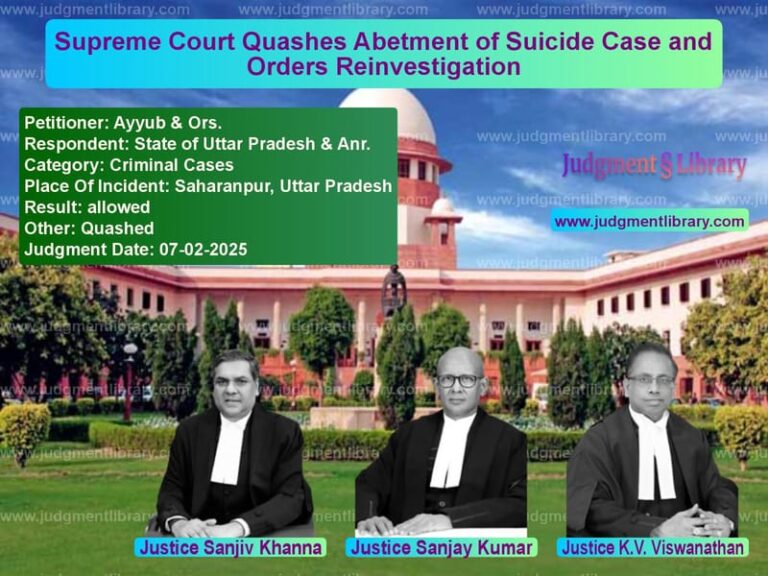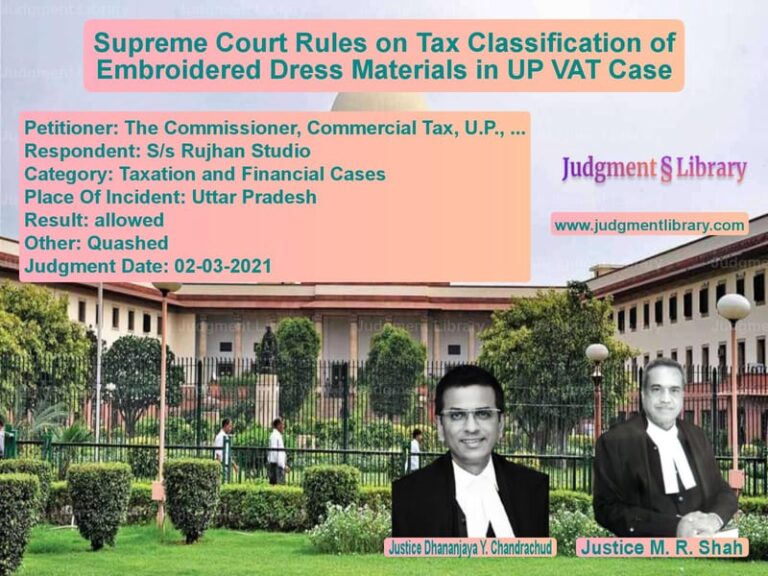Compassionate Appointment Eligibility: Supreme Court’s Interpretation of Retrospective Amendments
Compassionate appointments are a special provision in government employment, aimed at providing relief to the family of a deceased government servant who has passed away while in service. These appointments, however, do not follow the usual recruitment procedures and are granted as an exception under the law. The Supreme Court, in its judgment in the case of The Secretary to Government, Department of Education (Primary) & Ors. vs. Bheemesh Alias Bheemappa, addressed the issue of whether amendments to compassionate appointment rules could apply retrospectively.
The case arose from a dispute regarding the rejection of an application for compassionate appointment by the Karnataka government. The respondent, Bheemesh Alias Bheemappa, had applied for such an appointment after the death of his sister, who was employed as an Assistant Teacher in a government school. His claim was rejected on the grounds that, at the time of her death in 2010, the relevant rules did not recognize an unmarried brother as a dependent eligible for compassionate appointment.
Background of the Case
Following the death of his sister in 2010, the respondent sought an appointment under the Karnataka Civil Services (Appointment on Compassionate Grounds) Rules, 1996. The amendment introduced in 2012 expanded the definition of dependents to include an unmarried brother of a deceased unmarried female government employee. The competent authority rejected his application in 2012, citing that the amendment could not be applied retrospectively.
The Karnataka State Administrative Tribunal ruled in favor of the respondent, holding that the 2012 amendment had a retrospective effect. This decision was later upheld by the Karnataka High Court. The state, aggrieved by the ruling, approached the Supreme Court.
Key Issues Before the Court
- Does the amendment to the Karnataka Civil Services (Appointment on Compassionate Grounds) Rules, 2012, have retrospective application?
- Which set of rules should govern compassionate appointments – those in effect at the time of the employee’s death or those in effect at the time of considering the application?
Arguments by the Parties
Arguments of the Appellants (State Government)
The state government contended that the rule in force at the time of the employee’s death should apply. Since the amendment extending benefits to unmarried brothers was introduced in 2012, it could not be applied retrospectively to the respondent’s case. They relied on the general principle that laws and policies apply prospectively unless expressly stated otherwise.
Arguments of the Respondent
The respondent argued that since the amendment was introduced to correct an unjust exclusion, it should be given retrospective effect. He contended that his application should be considered under the revised rules rather than the ones existing at the time of his sister’s death.
Supreme Court’s Reasoning
The Supreme Court analyzed past precedents where courts had interpreted similar situations. The judgment highlighted two contrasting lines of decisions:
- One set of cases held that the rules in force at the time of the employee’s death should be applied.
- The other set of cases held that the rules in force at the time of considering the application should govern the case.
The Court noted that while there have been conflicting interpretations in previous cases, the established legal principle is that compassionate appointments are not a vested right. They exist only as an exception to normal recruitment rules and must be strictly governed by applicable policies.
The Court emphasized:
“There is no principle of statutory interpretation which permits a decision on the applicability of a rule to be based upon an indeterminate or variable factor.”
It further reasoned that using the date of application as the determining factor would lead to inconsistencies. Two people whose dependents died on the same day might receive different treatments depending on when their applications were processed, which is not a legally sustainable approach.
Supreme Court’s Decision
The Supreme Court ruled in favor of the state, setting aside the orders of the Karnataka High Court and the Administrative Tribunal. It concluded that the amendment introduced in 2012 could not be applied retrospectively to benefit the respondent, as it was not explicitly stated in the amendment. The respondent’s application for compassionate appointment was dismissed.
The Court observed:
“The interpretation as to the applicability of a modified Scheme should depend only upon a determinate and fixed criteria such as the date of death and not an indeterminate and variable factor.”
Implications of the Judgment
This ruling reinforces the principle that compassionate appointments are an exception and must be strictly governed by the rules in force at the time of the employee’s death. The decision provides clarity on the application of amended rules in such cases and prevents arbitrary variations based on administrative delays or policy changes.
The ruling sets a precedent that unless an amendment explicitly states retrospective application, it cannot be assumed. This judgment is significant for government employment policies and will likely impact future claims for compassionate appointments across various states.
Petitioner Name: The Secretary to Government, Department of Education (Primary) & Ors..Respondent Name: Bheemesh Alias Bheemappa.Judgment By: Justice V. Ramasubramanian, Justice Hemant Gupta.Place Of Incident: Karnataka.Judgment Date: 16-12-2021.
Don’t miss out on the full details! Download the complete judgment in PDF format below and gain valuable insights instantly!
Download Judgment: the-secretary-to-gov-vs-bheemesh-alias-bheem-supreme-court-of-india-judgment-dated-16-12-2021.pdf
Directly Download Judgment: Directly download this Judgment
See all petitions in Employment Disputes
See all petitions in Recruitment Policies
See all petitions in Public Sector Employees
See all petitions in Judgment by V. Ramasubramanian
See all petitions in Judgment by Hemant Gupta
See all petitions in allowed
See all petitions in supreme court of India judgments December 2021
See all petitions in 2021 judgments
See all posts in Service Matters Category
See all allowed petitions in Service Matters Category
See all Dismissed petitions in Service Matters Category
See all partially allowed petitions in Service Matters Category







